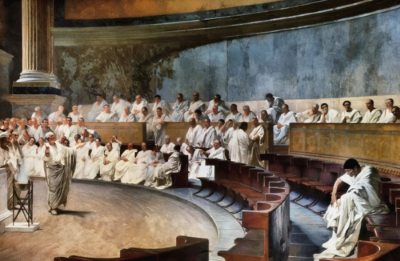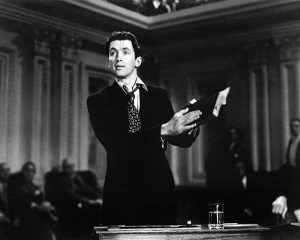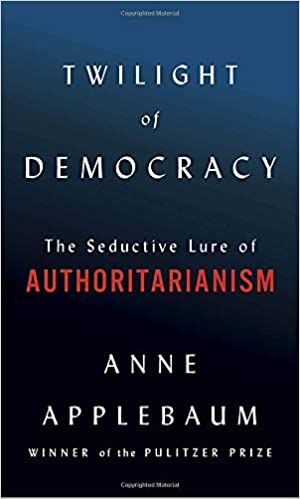
Is Rome worth one good man’s life? We believed it once. Make us believe it again. He was a soldier of Rome. Honor him.

Senator Gracchus: Who will help me carry him?
[Gladiators surround Maximus to carry him out of the arena]
“Gladiator” is remembered as an epic story of great heroism. Such movies of male heroics are a vanishing genre. Physical action jumped from the screen in some high paced rock-em-sock-em scenes. Many of them abounded in high energy in the tradition of Spartacus and Braveheart. Certainly the movies of the super-doers are not practitioners of movies where heroic human males function. Tom Cruise is almost the last of a dying breed of male heroes on the film screen. And he still does his own stunts.
In an easily-overlooked substrata of “Gladiator,” the Roman Senate, also featured in “Spartacus,” is challenged to lead Rome back from imperial rule to the days of the Roman Republic. Historically, nothing like that happened. The die was cast when Augustus became emperor and Rome remained an emperor. Still, this was a movie that used some historically real names but was not telling an historically real story. “Spartacus” was based on a real person but “Gladiator” was not. Still it sang the praises of the Roman Senate rising to the occasion just as we imagine the American Senate would if confronted by a would-be dictator.
Senate has a special ring to it. It sounds more august than being the member of the House, an Assembly, or a Legislature. The stature of the Senate has endured in the centuries since the Roman Republic and the Roman Empire.
Certainly the Founding Fathers of the United States had high respect and great hope for this body. It wasn’t elected by the mob. It was supposed to be a place of one’s betters (just as the Electoral College was). Once the era of the Virginia Presidential Dynasty ceased, the Senate did achieve the heights once anticipated by the Founding Fathers. For roughly over two decades from the 1820s to the 1840s, a trio of giants with presidential ambitions roamed the Senate floor. Daniel Webster of New England, John C. Calhoun of the Confederacy, and Henry Clay of the West were always on the ballot and sometimes becoming Vice President without ever taking that final step.
This year we celebrate the bicentennial of Webster’s address at the 50th anniversary of the Battle of Bunker Hill in 1825. Lafayette helped set the cornerstone (and visited Bunker Hill on the bicentennial celebration of his visit). Webster spoke again in 1843 when the monument was completed. These speeches bracketed his stature as an American hero.

Webster’s famed endured for another century. “The Devil and Daniel Webster” a short story in 1936 by Stephen Vincent Benet became a play in 1938 and then a movie in 1941. To make a short story even shorter, Webster defends a New England farmer who has sold his soul for earthly rewards. The jury is stacked against Webster with the leading reprobates in American history (as of that time). Nonetheless, Webster prevails.

While all this was going on, a specifically American Senate movie gained national attention. The move “Mr. Smith Goes to Washington” (1939), was a fable by Frank Capra about right will triumph even over the corrupt Senate, perhaps an even more evil for than the one Webster faced. In this case the hero is the naïve James Stewart who is appointed to the Senate to fill a vacancy due to a death. He is out of his league. He is ridiculed by the press and exploited by the corrupt senior Senator from his state whom Smith regards as a mentor. To escape the trap, Smith speaks for about 25 hours non-stop in the Senate before passing out. He convinces none of the corrupt Senators of the deal the senior Senator has concocted. Finally comes the most absurd part of the story. The senior Senator is overcome with remorse, flees the Senate chambers, and attempts suicide. He then returns to the Senate chambers, confesses his sins, and demands to be expelled.
The movie is considered to be one of the greatest films of all time. It was selected by the Library of Congress as one of the first 25 films for preservation in the United States National Film Registry in 1989, for its significance. Given the impact of Cory Booker’s 25-hour and 5-minute on the floor of the Senate in 2025, it is hard to imagine anyone taking “Mr. Smith Goes to Washington” seriously today.

Shortly after the fictional Mr. Smith goes to Washington, on June 1, 1950, Senator Margaret Chase Smith (R-ME) delivered her famous Declaration of Conscience, standing up to Senator Joseph McCarthy (R-WI), who was smearing Democrats as communists. “I think that it is high time for the United States Senate and its members to do some real soul searching and to weigh our consciences as to the manner in which we are performing our duty to the people of America and the manner in which we are using or abusing our individual powers and privileges,” she said. “I do not want to see the Republican party ride to political victory on the Four Horsemen of Calumny—Fear, Ignorance, Bigotry, and Smear.” With Trump’s frequent references to the Democrats as Communists, we see that his mind is still trapped in the 1980s.
Now it’s the President and his minions who are doing exactly what Margaret Smith chastised Republicans about.
There are two heroic images of Senators which have become part of American history since then. In the first. Howard Baker (Republican, TN), leads a delegation to confront President Richard Nixon during the Watergate crisis. The message is clear: time’s up, it’s time to go. Nixon complies and resigns in what become the “Howard Baker Moment.”

The second is when John McCain (Republican, Arizona) gives the thumbs down on July 27, 2017, to the Republican effort to gut Obamacare. Little did he know that seven years later the MAGA assault in the Big Ugly Bill would prevail.
SENATE GOP CONFIRMS TRUMP’S DOJ ‘HATCHET MAN’ FOR LIFETIME JUDGESHIP

MSNBC
Perhaps the most recent display of the degeneracy of the American Senate occurred in the 50-49 ratification of Emil Bove to a lifetime federal judgeship. The approval came despite whistleblower reports raised against him and nearly 1000 former prosecutors plus dozens of state and federal judges opposing his nomination.
During his stint in the Department of Justice he personally fired attorneys involved in the prosecution of the people who sought to overthrow the government on January 6. He forced others to resign and demanded a list of FBI agents to fire for political reasons. He appears to support defying court orders and doing so in derogatory language. It seems as if Trump finally has his Roy Cohn who will do whatever it takes. Speculation is that he is being groomed for a position on the Supreme Court. Unless MAGAs lose control of the Senate, if that’s what Trump wants then that is what will happen.
“Now imagine a second Trump presidency, during which dozens more Aileen Cannons are appointed to the courts—dozens more minimally qualified people who believe their role is to defend the president or avenge his enemies, not to defend the rule of law (Anne Applebaum, “The End of Judicial Independence,” The Atlantic, October 2024).
WE THE PEOPLE
As things stand now, We the People” can’t look to the House or the Senate for leadership in building a better tomorrow. The Senate’s vaunted image as the “the greatest deliberative body on earth” has been destroyed by the relentless assault on its powers by the President of the United States and by the complete capitulation of the MAGAs to the supreme MAGA. The self-pronounced would-be dictator is met by silence. No matter how many times he renders checks and balances as dead the MAGA Senate is silent. No matter how he has politicized the DOJ into his private army of retribution the MAGA Senate is silent. No matter how many American cities he invades with his private army the MAGA Senate is silent. The Senate is not a political body to be respected in real life or in the movies. Its giants are dead.
For an earlier version see Gladiator Senate versus American Senate: We Are on Fifth Avenue Now (January 27, 2020).






